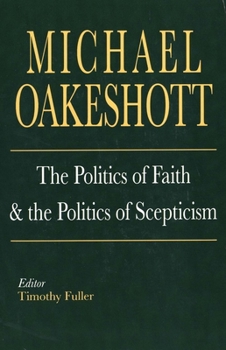The Politics of Faith and the Politics of Scepticism
Select Format
Select Condition 
Book Overview
Michael Oakeshott, the foremost British political philosopher of the twentieth century, died in 1990, leaving a substantial collection of unpublished material. Yale University Press is continuing to make available the best of these illuminating works. In this polished and hitherto unknown work, Oakeshott argues that modern politics was constituted out of a debate, persistent through centuries of European political experience down to our own day, over the question "What should governments do?" According to Oakeshott, two different answers have dominated our thought since the fifteenth century. One, exemplified by such thinkers as Rousseau and Marx, expresses a belief in the capacity of human beings to control, design, and monitor all aspects of social and political life, a belief fostered by the intoxicating increase in power available to governments in modern times. On the other hand, sceptics such as Montaigne, Pascal, and Hobbes argued that governments cannot, in principle, produce perfection and that we should prevent concentrations of power that may result in tyrannies that oppress the dignity of the human spirit. Oakeshott exposes the pitfalls of both positions and shows the value of a middle ground that incorporates scepticism with enough faith to avoid total quietism. Readers of Oakeshott will find here the thinking that lies behind his famous definition of politics as "the pursuit of intimations.".
Format:Paperback
Language:English
ISBN:0300105339
ISBN13:9780300105339
Release Date:May 1996
Publisher:Yale University Press
Length:160 Pages
Weight:0.60 lbs.
Dimensions:0.4" x 6.0" x 9.0"
Customer Reviews
1 rating
The role of conversation in politics
Published by Thriftbooks.com User , 25 years ago
One of Michael Oakeshott's essays is entitled "The role of poetry in the converstaion of mankind". This posthumously published book is about the role of conversation in politics. Or rather, about politics understood not as a crude excercise of power or an instrumentally rationalistic pusuit of pre-given interests, but as a conversation between two extremes or "ideal types", i.e. "the politics of faith" and "the politics of scepticism". On the one hand, these two extremes are the only thing that can be KNOWN about European politcs with certainty that can aspire for the title of Science. The rest is left to judgement. But this knowledge, in turn, is of a particular kind, since extremes never (or rarely) reveal themselves in their pure form and can be again only "imagined". "Imagined" for Oakeshott means "experienced", not in a way empiricists fancy we experience the world "out there", but reconstructed from the only raw material that is available in the world of ideas - language. While trying to grasp its ambiguity (that comes along with the ambivalence of political action and human conduct in general), Oakeshott not only helps to understand the complex phenomenon of European politics but makes his reader to live through, as it were, revolutionary thrusts of "the politics of faith" and maddening indecicivenss of "the politics of scepticism"; thus making a point not for a fixed "golden mean" between the two, but the "mean in action", historically and culturally specific condition that can be achieved only through moderation based in turn on a willingness to lay down any claims for the possesion of ultimate truth and therefore ultimate knowledge with regards to the goal towards which a society should be oriented.





